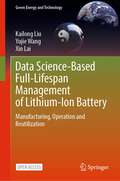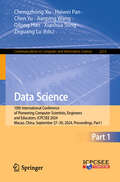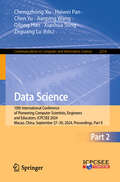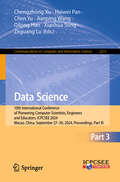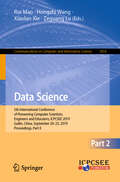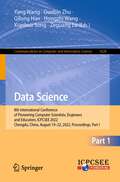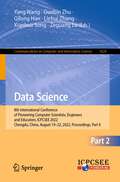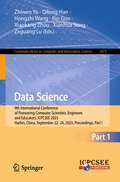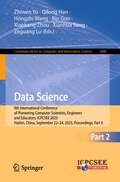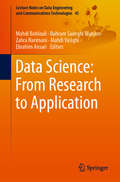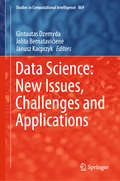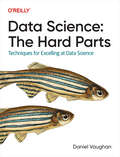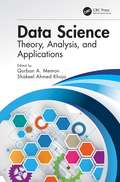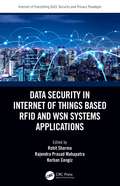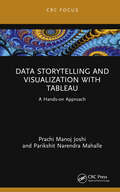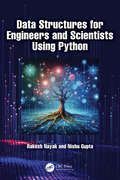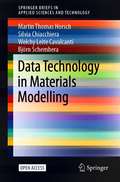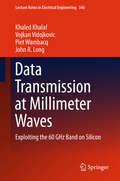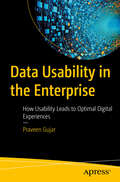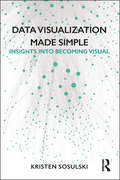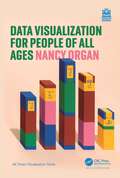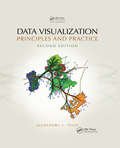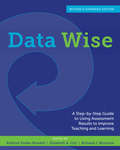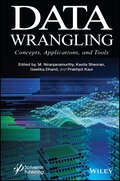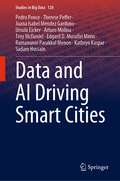- Table View
- List View
Data Science-Based Full-Lifespan Management of Lithium-Ion Battery: Manufacturing, Operation and Reutilization (Green Energy and Technology)
by Xin Lai Kailong Liu Yujie WangThis open access book comprehensively consolidates studies in the rapidly emerging field of battery management. The primary focus is to overview the new and emerging data science technologies for full-lifespan management of Li-ion batteries, which are categorized into three groups, namely (i) battery manufacturing management, (ii) battery operation management, and (iii) battery reutilization management. The key challenges, future trends as well as promising data-science technologies to further improve this research field are discussed. As battery full-lifespan (manufacturing, operation, and reutilization) management is a hot research topic in both energy and AI fields and none specific book has focused on systematically describing this particular from a data science perspective before, this book can attract the attention of academics, scientists, engineers, and practitioners. It is useful as a reference book for students and graduates working in related fields. Specifically, the audience could not only get the basics of battery manufacturing, operation, and reutilization but also the information of related data-science technologies. The step-by-step guidance, comprehensive introduction, and case studies to the topic make it accessible to audiences of different levels, from graduates to experienced engineers.
Data Science: 10th International Conference of Pioneering Computer Scientists, Engineers and Educators, ICPCSEE 2024, Macao, China, September 27–30, 2024, Proceedings, Part I (Communications in Computer and Information Science #2213)
by Qilong Han Xianhua Song Zeguang Lu Chen Yu Jianping Wang Chengzhong Xu Haiwei PanThis three-volume set CCIS 2213-2215 constitutes the refereed proceedings of the 10th International Conference of Pioneering Computer Scientists, Engineers and Educators, ICPCSEE 2024, held in Macau, China, during September 27–30, 2024. The 74 full papers and 3 short papers presented in these three volumes were carefully reviewed and selected from 249 submissions. The papers are organized in the following topical sections: Part I: Novel methods or tools used in big data and its applications; applications of data science. Part II: Education research, methods and materials for data science and engine; data security and privacy; big data mining and knowledge management. Part III: Infrastructure for data science; social media and recommendation system; multimedia data management and analysis.
Data Science: 10th International Conference of Pioneering Computer Scientists, Engineers and Educators, ICPCSEE 2024, Macao, China, September 27–30, 2024, Proceedings, Part II (Communications in Computer and Information Science #2214)
by Qilong Han Xianhua Song Zeguang Lu Chen Yu Jianping Wang Chengzhong Xu Haiwei PanThis three-volume set CCIS 2213-2215 constitutes the refereed proceedings of the 10th International Conference of Pioneering Computer Scientists, Engineers and Educators, ICPCSEE 2024, held in Macau, China, during September 27–30, 2024. The 74 full papers and 3 short papers presented in these three volumes were carefully reviewed and selected from 249 submissions. The papers are organized in the following topical sections: Part I: Novel methods or tools used in big data and its applications; applications of data science. Part II: Education research, methods and materials for data science and engine; data security and privacy; big data mining and knowledge management. Part III: Infrastructure for data science; social media and recommendation system; multimedia data management and analysis.
Data Science: 10th International Conference of Pioneering Computer Scientists, Engineers and Educators, ICPCSEE 2024, Macao, China, September 27–30, 2024, Proceedings, Part III (Communications in Computer and Information Science #2215)
by Qilong Han Xianhua Song Zeguang Lu Chen Yu Jianping Wang Chengzhong Xu Haiwei PanThis three-volume set CCIS 2213-2215 constitutes the refereed proceedings of the 10th International Conference of Pioneering Computer Scientists, Engineers and Educators, ICPCSEE 2024, held in Macau, China, during September 27–30, 2024. The 74 full papers and 3 short papers presented in these three volumes were carefully reviewed and selected from 249 submissions. The papers are organized in the following topical sections: Part I: Novel methods or tools used in big data and its applications; applications of data science. Part II: Education research, methods and materials for data science and engine; data security and privacy; big data mining and knowledge management. Part III: Infrastructure for data science; social media and recommendation system; multimedia data management and analysis.
Data Science: 5th International Conference of Pioneering Computer Scientists, Engineers and Educators, ICPCSEE 2019, Guilin, China, September 20–23, 2019, Proceedings, Part II (Communications in Computer and Information Science #1059)
by Hongzhi Wang Zeguang Lu Xiaolan Xie Rui MaoThis two volume set (CCIS 1058 and 1059) constitutes the refereed proceedings of the 5th International Conference of Pioneering Computer Scientists, Engineers and Educators, ICPCSEE 2019 held in Guilin, China, in September 2019. The 104 revised full papers presented in these two volumes were carefully reviewed and selected from 395 submissions. The papers cover a wide range of topics related to basic theory and techniques for data science including data mining; data base; net work; security; machine learning; bioinformatics; natural language processing; software engineering; graphic images; system; education; application.
Data Science: 8th International Conference of Pioneering Computer Scientists, Engineers and Educators, ICPCSEE 2022, Chengdu, China, August 19–22, 2022, Proceedings, Part I (Communications in Computer and Information Science #1628)
by Yang Wang Qilong Han Hongzhi Wang Xianhua Song Zeguang Lu Guobin ZhuThis two volume set (CCIS 1628 and 1629) constitutes the refereed proceedings of the 8th International Conference of Pioneering Computer Scientists, Engineers and Educators, ICPCSEE 2022 held in Chengdu, China, in August, 2022. The 65 full papers and 26 short papers presented in these two volumes were carefully reviewed and selected from 261 submissions. The papers are organized in topical sections on: Big Data Mining and Knowledge Management; Machine Learning for Data Science; Multimedia Data Management and Analysis.
Data Science: 8th International Conference of Pioneering Computer Scientists, Engineers and Educators, ICPCSEE 2022, Chengdu, China, August 19–22, 2022, Proceedings, Part II (Communications in Computer and Information Science #1629)
by Yang Wang Qilong Han Xianhua Song Zeguang Lu Guobin Zhu Liehui ZhangThis two volume set (CCIS 1628 and 1629) constitutes the refereed proceedings of the 8th International Conference of Pioneering Computer Scientists, Engineers and Educators, ICPCSEE 2022 held in Chengdu, China, in August, 2022. The 65 full papers and 26 short papers presented in these two volumes were carefully reviewed and selected from 261 submissions. The papers are organized in topical sections on: Big Data Management and Applications; Data Security and Privacy; Applications of Data Science; Infrastructure for Data Science; Education Track; Regulatory Technology in Finance.
Data Science: 9th International Conference of Pioneering Computer Scientists, Engineers and Educators, ICPCSEE 2023, Harbin, China, September 22–24, 2023, Proceedings, Part I (Communications in Computer and Information Science #1879)
by Qilong Han Hongzhi Wang Xianhua Song Zeguang Lu Zhiwen Yu Bin Guo Xiaokang ZhouThis two-volume set (CCIS 1879 and 1880) constitutes the refereed proceedings of the 9th International Conference of Pioneering Computer Scientists, Engineers and Educators, ICPCSEE 2023 held in Harbin, China, during September 22–24, 2023. The 52 full papers and 14 short papers presented in these two volumes were carefully reviewed and selected from 244 submissions. The papers are organized in the following topical sections:Part I: Applications of Data Science, Big Data Management and Applications, Big Data Mining and Knowledge Management, Data Visualization, Data-driven Security, Infrastructure for Data Science, Machine Learning for Data Science and Multimedia Data Management and Analysis.Part II: Data-driven Healthcare, Data-driven Smart City/Planet, Social Media and Recommendation Systems and Education using big data, intelligent computing or data mining, etc.
Data Science: 9th International Conference of Pioneering Computer Scientists, Engineers and Educators, ICPCSEE 2023, Harbin, China, September 22–24, 2023, Proceedings, Part II (Communications in Computer and Information Science #1880)
by Qilong Han Hongzhi Wang Xianhua Song Zeguang Lu Zhiwen Yu Bin Guo Xiaokang ZhouThis two-volume set (CCIS 1879 and 1880) constitutes the refereed proceedings of the 9th International Conference of Pioneering Computer Scientists, Engineers and Educators, ICPCSEE 2023 held in Harbin, China, during September 22–24, 2023.The 52 full papers and 14 short papers presented in these two volumes were carefully reviewed and selected from 244 submissions. The papers are organized in the following topical sections:Part I: Applications of Data Science, Big Data Management and Applications, Big Data Mining and Knowledge Management, Data Visualization, Data-driven Security, Infrastructure for Data Science, Machine Learning for Data Science and Multimedia Data Management and Analysis.Part II: Data-driven Healthcare, Data-driven Smart City/Planet, Social Media and Recommendation Systems and Education using big data, intelligent computing or data mining, etc.
Data Science: From Research to Application (Lecture Notes on Data Engineering and Communications Technologies #45)
by Zahra Narimani Mahdi Bohlouli Bahram Sadeghi Bigham Mahdi Vasighi Ebrahim AnsariThis book presents outstanding theoretical and practical findings in data science and associated interdisciplinary areas. Its main goal is to explore how data science research can revolutionize society and industries in a positive way, drawing on pure research to do so. The topics covered range from pure data science to fake news detection, as well as Internet of Things in the context of Industry 4.0.Data science is a rapidly growing field and, as a profession, incorporates a wide variety of areas, from statistics, mathematics and machine learning, to applied big data analytics. According to Forbes magazine, “Data Science” was listed as LinkedIn’s fastest-growing job in 2017.This book presents selected papers from the International Conference on Contemporary Issues in Data Science (CiDaS 2019), a professional data science event that provided a real workshop (not “listen-shop”) where scientists and scholars had the chance to share ideas, form new collaborations, and brainstorm on major challenges; and where industry experts could catch up on emerging solutions to help solve their concrete data science problems.Given its scope, the book will benefit not only data scientists and scientists from other domains, but also industry experts, policymakers and politicians.
Data Science: New Issues, Challenges and Applications (Studies in Computational Intelligence #869)
by Janusz Kacprzyk Gintautas Dzemyda Jolita BernatavičienėThis book contains 16 chapters by researchers working in various fields of data science. They focus on theory and applications in language technologies, optimization, computational thinking, intelligent decision support systems, decomposition of signals, model-driven development methodologies, interoperability of enterprise applications, anomaly detection in financial markets, 3D virtual reality, monitoring of environmental data, convolutional neural networks, knowledge storage, data stream classification, and security in social networking. The respective papers highlight a wealth of issues in, and applications of, data science. Modern technologies allow us to store and transfer large amounts of data quickly. They can be very diverse - images, numbers, streaming, related to human behavior and physiological parameters, etc. Whether the data is just raw numbers, crude images, or will help solve current problems and predict future developments, depends on whether we can effectively process and analyze it. Data science is evolving rapidly. However, it is still a very young field. In particular, data science is concerned with visualizations, statistics, pattern recognition, neurocomputing, image analysis, machine learning, artificial intelligence, databases and data processing, data mining, big data analytics, and knowledge discovery in databases. It also has many interfaces with optimization, block chaining, cyber-social and cyber-physical systems, Internet of Things (IoT), social computing, high-performance computing, in-memory key-value stores, cloud computing, social computing, data feeds, overlay networks, cognitive computing, crowdsource analysis, log analysis, container-based virtualization, and lifetime value modeling. Again, all of these areas are highly interrelated. In addition, data science is now expanding to new fields of application: chemical engineering, biotechnology, building energy management, materials microscopy, geographic research, learning analytics, radiology, metal design, ecosystem homeostasis investigation, and many others.
Data Science: Techniques for Excelling at Data Science
by Daniel VaughanThis practical guide provides a collection of techniques and best practices that are generally overlooked in most data engineering and data science pedagogy. A common misconception is that great data scientists are experts in the "big themes" of the discipline—machine learning and programming. But most of the time, these tools can only take us so far. In practice, the smaller tools and skills really separate a great data scientist from a not-so-great one.Taken as a whole, the lessons in this book make the difference between an average data scientist candidate and a qualified data scientist working in the field. Author Daniel Vaughan has collected, extended, and used these skills to create value and train data scientists from different companies and industries.With this book, you will:Understand how data science creates valueDeliver compelling narratives to sell your data science projectBuild a business case using unit economics principlesCreate new features for a ML model using storytellingLearn how to decompose KPIsPerform growth decompositions to find root causes for changes in a metricDaniel Vaughan is head of data at Clip, the leading paytech company in Mexico. He's the author of Analytical Skills for AI and Data Science (O'Reilly).
Data Science: Theory, Analysis and Applications
by Qurban A. Memon Shakeel Ahmed KhojaThe aim of this book is to provide an internationally respected collection of scientific research methods, technologies and applications in the area of data science. This book can prove useful to the researchers, professors, research students and practitioners as it reports novel research work on challenging topics in the area surrounding data science. In this book, some of the chapters are written in tutorial style concerning machine learning algorithms, data analysis, information design, infographics, relevant applications, etc. The book is structured as follows: • Part I: Data Science: Theory, Concepts, and Algorithms This part comprises five chapters on data Science theory, concepts, techniques and algorithms. • Part II: Data Design and Analysis This part comprises five chapters on data design and analysis. • Part III: Applications and New Trends in Data Science This part comprises four chapters on applications and new trends in data science.
Data Security in Internet of Things Based RFID and WSN Systems Applications (Internet of Everything (IoE))
by Rohit Sharma Korhan Cengiz Rajendra Prasad MahapatraThis book focuses on RFID (Radio Frequency Identification), IoT (Internet of Things), and WSN (Wireless Sensor Network). It includes contributions that discuss the security and privacy issues as well as the opportunities and applications that are tightly linked to sensitive infrastructures and strategic services. This book addresses the complete functional framework and workflow in IoT-enabled RFID systems and explores basic and high-level concepts. It is based on the latest technologies and covers the major challenges, issues, and advances in the field. It presents data acquisition and case studies related to data-intensive technologies in RFID-based IoT and includes WSN-based systems and their security. It can serve as a manual for those in the industry while also helping beginners to understand both the basic and advanced aspects of IoT-based RFID-related issues. This book can be a premier interdisciplinary platform for researchers, practitioners, and educators to present and discuss the most recent innovations, trends, and concerns as well as practical challenges encountered, and find solutions that have been adopted in the fields of IoT and analytics.
Data Storytelling and Visualization with Tableau: A Hands-on Approach
by Parikshit Narendra Mahalle Prachi Manoj JoshiWith the tremendous growth and availability of the data, this book covers understanding the data, while telling a story with visualization including basic concepts about the data, the relationship and the visualizations. All the technical details that include installation and building the different visualizations are explained in a clear and systematic way. Various aspects pertaining to storytelling and visualization are explained in the book through Tableau. Features Provides a hands-on approach in Tableau in a simplified manner with steps Discusses the broad background of data and its fundamentals, from the Internet of Everything to analytics Emphasizes the use of context in delivering the stories Presents case studies with the building of a dashboard Presents application areas and case studies with identification of the impactful visualization This book will be helpful for professionals, graduate students and senior undergraduate students in Manufacturing Engineering, Civil and Mechanical Engineering, Data Analytics and Data Visualization.
Data Structures for Engineers and Scientists Using Python
by Nishu Gupta Rakesh NayakThe text covers the fundamentals of Python programming and the implementation of data structures using Python programming with the help of worked-out examples. It provides a learning tool for engineers as well as for researchers and scientists of advanced level. The text further discusses important concepts such as polynomial manipulation, sparse matrices, implementation of stack using the queue model and topological sorting.This book: Discusses the implementation of various data structures such as an array, stack, queue, tree and graph along with sorting and searching algorithms. Includes programming tips to highlight important concepts and help readers avoid common programming errors. Presents each concept of data structure with a different approach and implements the same using Python programming. Offers rich chapter-end pedagogy including objective-type questions (with answers), review questions and programming exercises to facilitate review. Covers fundamentals of Python up to object-oriented concepts including regular expression. It is primarily written for senior undergraduate, graduate students and academic researchers in the fields of electrical engineering, electronics and communication engineering, computer engineering and information technology.
Data Technology in Materials Modelling (SpringerBriefs in Applied Sciences and Technology)
by Martin Thomas Horsch Silvia Chiacchiera Welchy Leite Cavalcanti Björn SchemberaThis open access book discusses advances in semantic interoperability for materials modelling, aiming at integrating data obtained from different methods and sources into common frameworks, and facilitating the development of platforms where simulation services in computational molecular engineering can be provided as well as coupled and linked to each other in a standardized and reliable way. The Virtual Materials Marketplace (VIMMP), which is open to all service providers and clients, provides a framework for offering and accessing such services, assisting the uptake of novel modelling and simulation approaches by SMEs, consultants, and industrial R&D end users. Semantic assets presented include the EngMeta metadata schema for research data infrastructures in simulation-based engineering and the collection of ontologies from VIMMP, including the ontology for simulation, modelling, and optimization (OSMO) and the VIMMP software ontology (VISO).
Data Transmission at Millimeter Waves: Exploiting the 60 GHz Band on Silicon (Lecture Notes in Electrical Engineering #346)
by Khaled Khalaf Vojkan Vidojkovic Piet Wambacq John R. LongThis book describes the design of a receiver front-end circuit for operation in the 60GHz range in 90nm CMOS. Physical layout of the test circuit and post-layout simulations for the implementation of a test chip including the QVCO and the first stage divider are also presented. The content of this book is particularly of interest to those working on mm-wave frequency generation and signal reception.
Data Usability in the Enterprise: How Usability Leads to Optimal Digital Experiences
by Praveen GujarEnsuring data usability is paramount to unlocking a company’s full potential and driving informed decision-making. Part of author Saurav Bhattacharya’s trilogy that covers the essential pillars of digital ecosystems—security, reliability, and usability—this book offers a comprehensive exploration of the fundamental concepts, principles, and practices essential for enhancing data accessibility and effectiveness. You’ll study the core aspects of data design, standardization, and interoperability, gaining the knowledge needed to create and maintain high-quality data environments. By examining the tools and technologies that improve data usability, along with best practices for data visualization and user-centric strategies, this book serves as an invaluable resource for professionals seeking to leverage data more effectively. The book also addresses crucial governance issues, ensuring data quality, integrity, and security are maintained. Through a detailed analysis of data governance frameworks and privacy concerns, you’ll see how to manage data responsibly. Additionally, the book includes compelling case studies that highlight successful data usability implementations, future trends, and the challenges faced in achieving optimal data usability. By fostering a culture of data literacy and usability, this book will help you and your organization navigate the evolving data landscape and harness the power of data for innovation and growth. What You Will Learn Understand the fundamental concepts and importance of data usability, including effective data design, enhancing data accessibility, and ensuring data standardization and interoperability. Review the latest tools and technologies that enhance data usability, best practices for data visualization, and strategies for implementing user-centric data approaches. Ensure data quality and integrity, while navigating data privacy and security concerns. Implement robust data governance frameworks to manage data responsibly and effectively. Who This Book Is For Cybersecurity and IT professionals
Data Visualization Made Simple: Insights into Becoming Visual
by Kristen SosulskiData Visualization Made Simple is a practical guide to the fundamentals, strategies, and real-world cases for data visualization, an essential skill required in today’s information-rich world. With foundations rooted in statistics, psychology, and computer science, data visualization offers practitioners in almost every field a coherent way to share findings from original research, big data, learning analytics, and more. In nine appealing chapters, the book: examines the role of data graphics in decision-making, sharing information, sparking discussions, and inspiring future research; scrutinizes data graphics, deliberates on the messages they convey, and looks at options for design visualization; and includes cases and interviews to provide a contemporary view of how data graphics are used by professionals across industries Both novices and seasoned designers in education, business, and other areas can use this book’s effective, linear process to develop data visualization literacy and promote exploratory, inquiry-based approaches to visualization problems.
Data Visualization for People of All Ages (ISSN)
by Nancy OrganData visualization is the art and science of making information visible. On paper and in our imaginations, it’s a language of shapes and colors that holds our best ideas and most important questions. As we find ourselves swimming in data of all kinds, visualization can help us to understand, express, and explore the richness of the world around us. No matter your age or background, this book opens the door to new ways of thinking and sharing through the power of data visualization.Data Visualization for People of All Ages is a field guide to visual literacy, born from the author’s personal experience working with world-class scholars, engineers, and scientists. By walking through the different ways of showing data—including color, angle, position, and length—you’ll learn how charts and graphs truly work so that no visualization is ever a mystery or out of reach. It doesn’t stop at what fits on a page, either. You’ll journey into cutting-edge topics like data sonification and data physicalization, using sound and touch to share data across the different senses. Packed with practical examples and exercises to help you connect the dots, this book will teach you how to create and understand data visualizations on your own—all without writing a single line of code or getting tangled up in software.Written with accessibility in mind, this book invites everyone to the table to share the joy of one of today’s most necessary skills. Perfect for home or classroom use, this friendly companion gives people of all ages everything they need to start visualizing with confidence.
Data Visualization: Principles and Practice, Second Edition
by Alexandru C. TeleaDesigning a complete visualization system involves many subtle decisions. When designing a complex, real-world visualization system, such decisions involve many types of constraints, such as performance, platform (in)dependence, available programming languages and styles, user-interface toolkits, input/output data format constraints, integration wi
Data Wise, Revised and Expanded Edition: A Step-by-Step Guide to Using Assessment Results to Improve Teaching and Learning
by Kathryn Parker BoudettData Wise, Third Edition will be available in August 2025 ***Data Wise, Revised and Expanded Edition presents a continuous, sustainable process that allows school leaders to harness classroom metrics to inform educational practice. At its core, the Data Wise method fosters effective collaboration among educators, enabling teams to study a wide range of evidence and then use what they learn to enrich school culture and climate and ensure that each student thrives. Kathryn Parker Boudett, Elizabeth A. City, and Richard J. Murnane offer clear guidance for enacting all stages of the Data Wise improvement process and for integrating data inquiry into long-term institutional practice. They begin with actions that lay the groundwork for collaboration: advancing assessment literacy among contributors, building productive professional learning communities, and identifying targets for change. They continue with advice on evaluating progress and boosting accountability. Throughout the book, the authors recommend practical tools and proven practices, such as the plus/delta protocol and the ACE Habits of Mind (focusing on action, collaboration, and evidence), that help school leaders optimize the quality of meetings, especially those in which educators analyze data. They also provide tips for how to make best use of developments in education and technology, from Common Core State Standards to online collaboration tools. The field-tested strategies of the Data Wise improvement process have been used to great success in schools around the world, showing that careful examination of test scores, classroom data, and other educational evaluations can become a catalyst for important schoolwide conversations and transformations.
Data Wrangling: Concepts, Applications and Tools
by Prabhjot Kaur M. Niranjanamurthy Kavita Sheoran Geetika DhandDATA WRANGLING Written and edited by some of the world’s top experts in the field, this exciting new volume provides state-of-the-art research and latest technological breakthroughs in data wrangling, its theoretical concepts, practical applications, and tools for solving everyday problems. Data wrangling is the process of cleaning and unifying messy and complex data sets for easy access and analysis. This process typically includes manually converting and mapping data from one raw form into another format to allow for more convenient consumption and organization of the data. Data wrangling is increasingly ubiquitous at today’s top firms. Data cleaning focuses on removing inaccurate data from your data set whereas data wrangling focuses on transforming the data’s format, typically by converting “raw” data into another format more suitable for use. Data wrangling is a necessary component of any business. Data wrangling solutions are specifically designed and architected to handle diverse, complex data at any scale, including many applications, such as Datameer, Infogix, Paxata, Talend, Tamr, TMMData, and Trifacta. This book synthesizes the processes of data wrangling into a comprehensive overview, with a strong focus on recent and rapidly evolving agile analytic processes in data-driven enterprises, for businesses and other enterprises to use to find solutions for their everyday problems and practical applications. Whether for the veteran engineer, scientist, or other industry professional, this book is a must have for any library.
Data and AI Driving Smart Cities (Studies in Big Data #128)
by Ursula Eicker Arturo Molina Pedro Ponce Troy McDaniel Therese Peffer Juana Isabel Mendez Garduno Edgard D. Musafiri Mimo Ramanunni Parakkal Menon Kathryn Kaspar Sadam HussainThis book illustrates how the advanced technology developed for smart cities requires increasing interaction with citizens to motivate and incentive them. Megacities' needs have been encouraging for the creation of smart cities in which the needs of inhabitants are collected using virtualization and digitalization systems. On the other hand, machine learning algorithms have been implemented to provide better solutions for diverse areas in smart cities, such as transportation and health. Besides, conventional electric grids have transformed into smart grids, improving energy quality. Gamification, serious games, machine learning, dynamic interfaces, and social networks are some elements integrated holistically to provide novel solutions to design and develop smart cities. Also, this book presents in a friendly way the concept of social devices that are incorporated into smart homes and buildings. This book is used to understand and design smart cities where citizens are strongly interconnected so the demand response time can be reduced.
